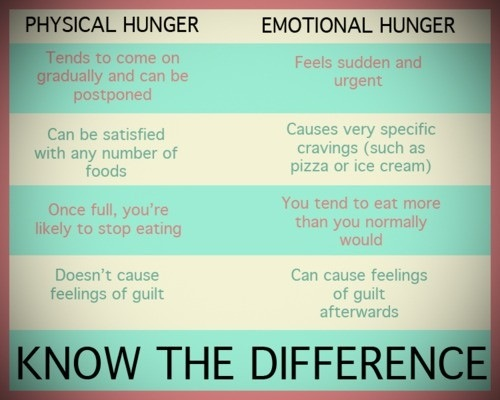EMOTIONAL VS. PHYSICAL HUNGER

Are you eating because you’re physically hungry or because you feel something is lacking inside of you? Have you lost conscious contact with yourself as well as what you feel? Do you use food as a means of stuffing, numbing or otherwise easing your emotional discomfort? Are you lost, afraid and unsure, longing to find what you feel is lacking? Perhaps these descriptions of the differences between physical and emotional hunger will help you decide.
Emotional Hunger
Comes on all of the sudden. One minute you aren’t even thinking about food and the next you are starving. Your desire to eat goes from zero to 100 within a very short period of time.
Makes you crave certain foods. It doesn’t matter that you eat, but that you eat very specific types of food such as pasta, pizza, chocolate or a cheeseburger. With emotional eating, you must have your favorite foods–substitutes simply will not do!
Is experienced “above the neck.” Emotional cravings begin in the mouth and mind. That’s right, it’s all “in your head.” The mouth wants to taste that special treat while your mind spins with thoughts of what it will be like when you put that first bite in your mouth.
Is urgent. You have to have what you want and you’ve got to have it right now. It’s all about the “quick fix” and instant gratification.
Is often connected to painful emotions and stress. You just had a fight with a friend; your boss just dumped more work on your desk; or you just opened your credit card bill and don’t know how you are going to pay.
Involves mindless or absent-minded eating. You don’t even realize you are doing it. At times it can even feel like someone else is putting the food on your tongue and moving it toward your mouth. Next thing you know the whole box of cookies or pizza is gone.
Doesn’t stop when your body signals it’s full. Emotional eating stems from the need to stuff, numb and cover-up painful feelings. You keep eating and eating to deaden the pain; consuming two, three, four or more helpings until you may even become physically ill from being overly full.
Creates feelings of guilt, shame, remorse and self-loathing that are constant companions to the food.The paradox of emotional eating involves eating to feel better, but only feeling worse and then eating more. Vows to “never do it again” or to go on a diet, skip the next meal or exercise to burn it all off are never ending.
Physical Hunger
Comes on gradually. First there’s a little rumble in your tummy; an hour later that rumble turns into a growl. Physical hunger involves a slow, steady progression of clues that it is time to eat.
Doesn’t care what you eat, as long as you eat. You may have certain preferences for food, but you are flexible and open to a variety of options.
Originates in the stomach and is felt in the body. You may even begin to feel the gnawing, emptiness in your stomach as pain.
Doesn’t need immediate gratification. Physical hunger is patient. It would prefer that you eat sooner than later, but doesn’t insist that you eat right away.
Is the direct result of a physical need. Physical hunger occurs because your body has used all the food you previously fed it, or it has been several hours since your last meal. You may even experience light-headedness, dizziness or low energy if it’s been a really long time since you last ate.
Involves a conscious choice to eat. You are aware you are hungry and have decided to eat in order to fulfill your physical need. You deliberately pick what and how much you want to eat.
Simply stops when you are full. Physical hunger revolves around a need to nourish and fuel the body. As soon as the need is fulfilled, the eating stops.
Understands eating is necessary. There is no guilt, shame, remorse or negative feelings involved. The person realizes they have to eat to live, and that’s all.
Understands eating is necessary.There is no guilt, shame, remorse or negative feelings involved. The person realizes they have to eat to live, and that’s all.
Read More here:
http://www.livestrong.com/article/14885-emotional-vs-physical-hunger/



